Rama Navami – the birthday of Lord Rama
http://www.prabhupadanugas.eu/?p=18922#more-18922
Ram Navami, or Ramanavami, is celebrated as the birthday of Lord Rama and it falls on the ninth day of Shukla Paksha (waxing phase of moon) in the month of Chaitra (March – April). In 2011, the date of Ram Navami is April 12. Ramanavami also marks the end of the Chaitra Navratri. Lord Rama is the seventh incarnation of Lord Vishnu.
Rama Navami (Devanāgarī: राम नवमी) also known as Sri Rama Navami ( IAST SriRāma-navamī ). Sri Ram Navami is a great festival in India, celebrating the birth of Lord Rama to King Dasharatha and Queen Kausalya of Ayodhya. Rama is the 7th incarnation of the Dashavatara of Vishnu. The festival falls in the Shukla Paksha on the Navami, the ninth day of the month of Chaitra in the Hindu calendar. Thus it is also known as Chaitra Masa Suklapaksha Navami, and marks the end of the nine-day Chaitra-Navratri celebrations.
The ancient story of Ramayana and the tale of Rama has been a part of the vedic culture for a very long time. Rama is one of the most potent incarnations of the Lord Vishnu, who appeared to destroy the mighty Ravana. The festival of Rama Navami is celebrated by Hindus to remember the auspicious nine days of Rama’s life when he was born. The birth of the young Lord Rama is celebrated during the 9 days that end on the ninth day of the month of Chaitra, the final month of the Hindu calendar. The day is generally also known as Chaitra Navaratri to mark the birth of Lord Rama.
The Tenth Chapter of the Ninth Canto of Srimad Bhagavatam describes how Lord Ramachandra appeared in the dynasty of Maharaja Khatvanga.
It also describes the Lord’s activities, telling how He killed Ravana and returned to Ayodhya, the capital of His kingdom.
The son of Maharaja Khatvanga was Dirghabahu, and his son was Raghu. The son of Raghu was Aja, the son of Aja was Dasaratha, and the son of Dasaratha was Lord Ramachandra, the Supreme Personality of Godhead. When the Lord descended into this world in His full quadruple expansion-as Lord Ramachandra, Lakshmana, Bharata and Satrughna, great sages like Valmiki who were actually in knowledge of the Absolute Truth described His transcendental pastimes. Srila Sukadeva Gosvami describes these pastimes in brief.
In the arena of the sacrifice performed by Visvamitra, when He was just a young boy Lord Ramachandra, helped the great sage by killing Subahu and striking Marica, the she-demon, who was disturbing the sages in their daily discharge of duties.
In the assembly where mother Sita was to choose her husband, in the midst of the heroes of this world, He broke the bow belonging to Lord Shiva. Thus the Lord achieved the hand of mother Sita, who was indeed the goddess of fortune who constantly rests on the chest of the Lord. While returning from Sita’s home, Lord Ramachandra met Parasurama. Although Parasurama was very proud, having rid the earth of the royal order twenty-one times, he was defeated by the Lord, who appeared to be a ksatriya of the royal order.
Maharaja Dasaratha had three wives. One of them, Kaikeyi, served him very pleasingly, and he therefore wanted to give her a benediction. At the time of the coronation of Prince Ramachandra, Kaikeyi requested her husband to enthrone her son Bharata and send Ramachandra to the forest. Maharaja Dasaratha, being bound by his promise, ordered Ramachandra to go to the forest. And the Lord, as an obedient son, accepted the order immediately and entered the forest, accompanied by Lakshmana and Sita.
While wandering in the forest, where He accepted a life of hardship, carrying His invincible bow and arrows in His hand, Lord Ramachandra deformed Ravana’s sister, who was polluted with lusty desires, by cutting off her nose and ears. He also killed her fourteen thousand Raksasa friends, headed by Khara, Trisira and Dusana. When Ravana, who had ten heads on his shoulders, heard about the beautiful and attractive features of Sita, his mind was agitated by lusty desires, and he went to kidnap her. Ravana’s kidnapping of Sitadevi was the beginning of this demon’s misfortune. When Marica (a magician) assumed the form of a golden deer, Lord Ramachandra went to bring the deer to please Sitadevi, but in the meantime Ravana took advantage of the Lord’s absence to kidnap her.
Then the Lord killed the demon Kabandha and the commander Vali and established a friendly relationship with Sugriva. After organizing the military strength of the monkeys He went with them to the shore of the sea. Then Samudra came to the Lord and surrendered to Him, wanting to help Him in every way. Samudra told that his water will present no impediment to Lord’s going to Lanka, but requested Lord Ramachandra to construct a bridge over it to spread His transcendental fame.
Great mountain peaks covered with trees and plants were thrown into the sea by the monkey soldiers and began to float by the supreme will of the Lord. Thus constructiong the bridge, with the direction and help of Vibhisana, Ravana’s brother, the Lord, along with the monkey soldiers, headed by Sugriva, Nila and Hanuman, entered Ravana’s kingdom. Previously, Hanuman, the eternal servant of the Lord, had set fire to Lanka, and now, the entire city of Lanka was disturbed by the monkey soldiers. When Ravana saw these, he called for Nikumbha, Kumbha, Dhumraksa, and other Rakshasas and also his son Indrajit. Thereafter he called for Prahasta, Atikaya, Vikampana and finally Kumbhakarna. Then he induced all his followers to fight against the enemies.
Lord Ramachandra, surrounded by Lakshmana and monkey soldiers attacked the soldiers of the Rakshasas, who were fully equipped with various invincible weapons. But because the soldiers of Ravana were condemned by the curse of mother Sita, the monkeys were able to kill them simply by throwing stones and trees. Lord Ramachandra rebuked Ravana for his shameful act and then He fixed an arrow to His bow, aimed at Ravana, and released the arrow, which pierced Ravana’s heart like a thunderbolt. Ravana, vomiting blood from his ten mouths, fell from his airplane and was thus killed.
Then in accordance with Lord Ramachandra’s order, Vibhishana ruled Lanka. The Lord delivered Sitadevi from the Asoka forest and carried her in a flower airplane to His capital Ayodhya, where He was received by His brother Bharata.
After Lord Ramachandra, accompanied by Lord Lakshmana and mother Sitadevi, met all His relatives, the great sage Vasistha enthroned Him as King and Lord Ramachandra ruled Ayodhya. He cared for the citizens exactly like a father, and the citizens, being fully engaged in their occupational duties of varna and asrama, accepted Him as their father. Lord Ramachandra became King during Treta-yuga, but because of His good government, the age was like Satya-yuga. Everyone was religious and completely happy. During the reign of Lord Ramachandra the forests, the rivers, the hills and mountains, the states, the seven islands and the seven seas were all favorable in supplying the necessities of life for all living beings.
When Lord Ramachandra, the Supreme Personality of Godhead, was the King of this world, all bodily and mental suffering, disease, old age, bereavement, lamentation, distress, fear and fatigue were completely absent. There was even no death for those who did not want it. All these facilities existed because of Lord Ramachandra’s presence as the King of the entire world. A similar situation could be introduced immediately, even in this age called Kali, the worst of all ages. It is said, kali-kale nama-rupe Krishna-avatara: Krishna descends in this Kali-yuga in the form of His holy name—Hare Krishna, Hare Rama. If we chant offenselessly, Rama and Krishna are still present in this age. The kingdom of Rama was immensely popular and beneficial, and the spreading of this Hare Krishna movement can immediately introduce a similar situation, even in this Kali-yuga.
Related posts:
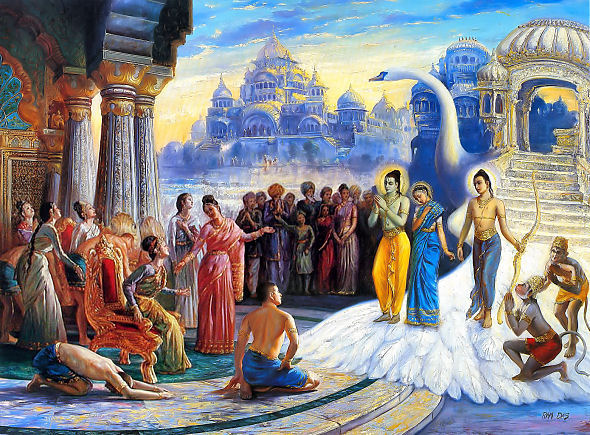
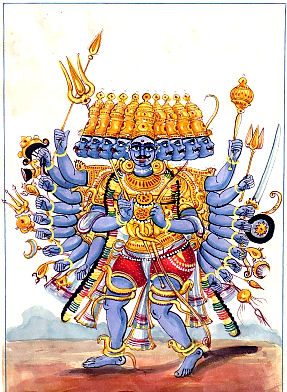
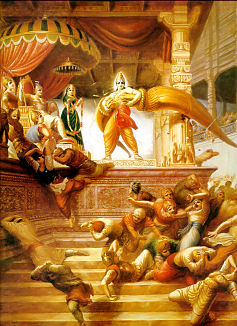
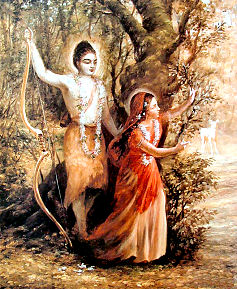
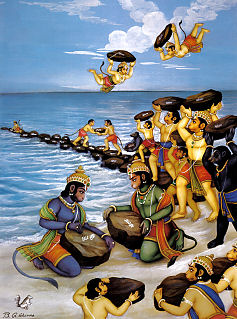
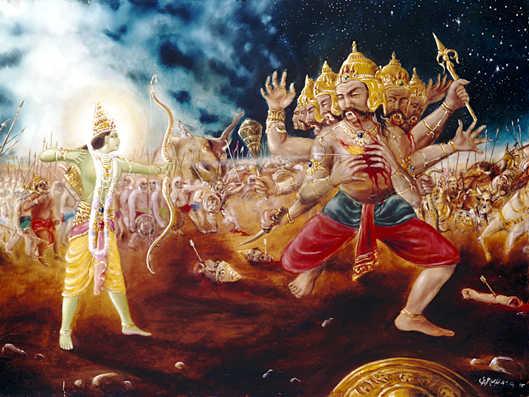
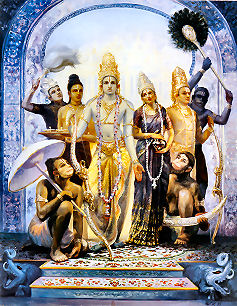
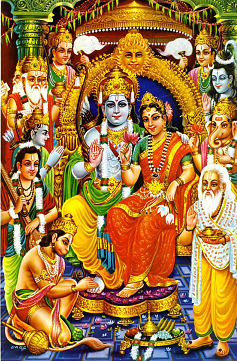
Comments
Sita’s abduction by the demon Ravana
The Story of Sita’s abduction by the demon Ravana
and the killing of Jatayu bird
Mahabharatha CHAPTER XXV
Before Ravana kidnapped Sita, he send his demoniac brother Marichi (a magician) to the hermitage of Sita-Rama, who lured away Rama and Laksmana in the form of a golden dear deep into the forest.
Maricha assumed the shape of a golden deer with silvern spots; its horns were tipped with sapphire and its eyes were like to blue lotus blooms. This beautiful animal of gentle seeming grazed below the trees until Sita beheld it with wondering eyes as she came forth to pluck wild flowers. She called to Rama, saying: “A deer of wondrous beauty is wandering through the grove. I long to rest at ease on its golden skin.”
Said Rama: “O Lakshmana, I must fulfil the desire of Sita. Tarry with her until I obtain this animal for her.”
So speaking, he lifted his bow and hastened away through the trees.
Lakshmana spoke to Sita and said: “My heart is full of misgiving. Sages have told that Rakshasas are wont to assume the forms of deer. Ofttimes have monarchs been waylaid in the forest by artful demons who came to lure them away.”
Rama chased the deer a long time hither and thither through the forest, and at length he shot an arrow which pierced its heart. In his agony Maricha sprang out of the deer’s body, and cried out in imitation of Rama’s voice: “Sita, Sita, save me! O save me, Lakshmana!” Then he died, and Rama perceived that he had slain the Rakshasa Maricha, brother of Ravana.
Ravana sends his demoniac brother Marichi (a magician) to decive Rama and Sita
Sita’s heart was filled with alarm when she heard the voice of the Rakshasa calling in imitation of her husband. She spake to Lakshmana, saying: “Hasten and help my Rama; he calls for help.”
Said Lakshmana: “Do not fear for Rama, O fair one. No Rakshasa can injure him. I must obey his command and remain beside thee. The cry thou hast heard is an illusion wrought by demons.”
Sita was wroth; her eyes sparkled and her voice shook as she spake, saying: “Hath thine heart grown callous? Art thou thy brother’s enemy? Rama is in peril, and yet thou dost not hasten to succour him. Hast thou followed him to the forest desiring that he should die, so as to obtain his widow by force? If so, thy hope is a delusion, because I will not live one moment after he dies. It is useless, therefore, for thee to tarry here.”
Said Lakshmana, whose eyes were filled with tears: “I do not fear for Rama. . . . O Sita! thy words scald me, for thou art as a mother unto me. I cannot answer thee. My heart is free from sin. . . . Alas! that fickle women with poisonous tongues should endeavour to set brother against brother.”
Sita wept, and Lakshmana, repenting that he had spoken harshly, said: “I will obey thee and hasten unto Rama. May the spirits of the forest protect thee against hidden enemies. I am troubled because I behold evil omens. When I return, may I behold Rama by thy side.”
Said Sita: “If Rama is slain I will die by drowning, or by poison, or else by the noose. I cannot live without Rama.”
Ravana kept watch the while, and when he saw Lakshmana leaving the hermitage, he assumed the guise of a forest sage and went towards the lonely and sad-hearted Sita. The jungle had grown silent. Ravana saw that Sita was beautiful as the solitary moon at midnight when it illumines the gloomy forest. He spake, saying: “O woman of golden beauty, O shy one in full bloom, robed in silk and adorned with flowers, art thou Sri, or Gauri, 1 or the goddess of love, or a nymph of the forest? Red as coral are thy lips; thy teeth shine like to jasmine; love dwelleth in thine eyes so soft and lustrous. Slender art thou and tall, with shapely limbs, and a bosom like to ripe fruit. . . . Wherefore, O fair one, with long shining tresses, dost thou linger here in the lonesome jungle? More seemly it were if thou didst adorn a stately palace. Choose thee a royal suitor; be the bride of a king. What god is thy sire, O beautiful one?”
Sita honoured Ravana, believing that he was a Brahman. She told him the story of Rama’s exile, and said: “Rest thyself here until the jungle-ranging brethren return to greet thee.”
Then Ravana said: “No Brahman am I, but the ruler of the vengeful Rakshasas. I am Ravana, King of Lanka, dreaded by even the gods. Thy beauty, O fair one, clad in yellow silk, has taken captive my heart. Be my chief queen, O Sita, and five thousand handmaidens will wait upon thee. Share mine empire and my fame.”
Said Sita, whose eyes flashed fiery anger: Knowest thou Rama, the god-like hero who is ever victorious in strife? I am his wedded wife. Knowest thou Rama, the sinless and saintly one, who is strongly armed and full of valour and virtue? I am his wedded wife. What madness hath prompted thee to woo the wife of so mighty a warrior? I follow Rama as a lioness follows a lion. Canst thou, a prowling jackal, hope to obtain a lioness? Snatch from the jaws of a lion the calf which it is devouring, touch the fang of a cobra when it seizeth a fallen victim, or tear up a mountain by the roots, or seize the sun in heaven before thou dost seek to win or capture the wife of Rama, the avenger.”
Ravana boasted his prowess, saying: “I have power to slay even Yama. I can torture the sun and shoot arrows through the earth. Little dost thou know of my glory and my heroism.”
Then he changed his shape and stood up in gigantic demon form with vast body and ten heads and twenty arms. . . . Seizing Sita, he soared through the air with her as Garuda carries off the queen of serpents; he placed her in his chariot and went away swifter than the wind.
The unseen spirits of the jungle looked on, and they heard the cries of Sita as she called in vain for Rama and Lakshmana.
Jatayu, the Monarch and King of Vultures, who lay asleep on a mountain top, heard her and awoke; he darted upon Ravana like to the thunderbolt of Indra. A fierce battle was fought in mid air. Jatayu destroyed the chariot and killed the Rakshasa asses, but Ravana took Sita in his arms, and, soaring higher than the Vulture king, disabled him with his sword.
When Ravana reached his palace he delivered Sita to a band of Rakshasa women, commanding them to guard her by day and by night.
Now, when Sita was dwelling in the palace of the demon king, guarded by Rakshasa women, Ravana approached her again and again, and addressed to her sweet speeches, praising her beauty and endeavouring to win her love. But Sita rejected him with scorn. Although she was his prisoner, he could not win her by force. She was strengthened by her own virtue; she was protected by Brahma’s dread decree.
Be it known that once upon a time the lustful Ravana had seized by force a nymph of Indra’s heaven, whose name was Punjikashthala. When he committed that evil offence, Brahma spake angrily and said that Ravana’s head would be rent asunder (split in thousands of peaces) if ever again he attempted to act in like manner towards another female in heaven or upon earth.
Sita said unto the demon king: “Thou shalt never have me for wife either in this world or in the next. Rather would I die than gratify thy desire.”
Angry was Ravana, and he commanded the female Rakshasas to convey Sita to the Asoka grove, believing that her heart would be melted by the beauties of that fair retreat. “Thou wilt provide her with fine raiment,” he said, “and with rich ornaments and delicious food, thou wilt praise me before her, and anon threaten her with dire calamity if she refuseth to become my bride.”
Sita remembered Rama in her heart by day and by night, and wept and moaned for him, refusing to be comforted.
Meanwhile, when Rama and Laksmana returned to their hermitage and found it bereft of Sita, Rama started to weep for Sita. He searched hither and thither through the forest, and called on every mountain and tree and on every bird and every beast, asking whither she had gone.
On the morrow the brethren went forth again in quest of the lost one. They came to the place where Jatayus lay dying, and that lordly bird spake to Rama and related all that had befallen Sita and himself.
Rama sat on the ground: he embraced the dying Vulture King, and said unto Lakshmana: “Alas! my brother, the noble Jatayus hath given up his life to serve me. I have lost my kingdom and my-sire; I have lost Sita, and now our ally, the Rajah-Jatayu, the king of Vultures, is dying. . . . All my friends are passing away. If I were to sit in the shade of a tree, the tree would fall; if I stooped to drink water from a river, verily the river would dry up.” . . .
Then he spake to Jatayu, saying: “Whither hath Ravana gone with my well-beloved?”
Said the Vulture: “He went southward towards an unknown forest fastness. . . . Alas! my strength fails, mine eyes grow blind, my life is ebbing from my body.”
When he had spoken thus, Jatayus died in Rama’s arms, and his soul ascended to the heaven of Vishnu in a chariot of fire.
Related posts: